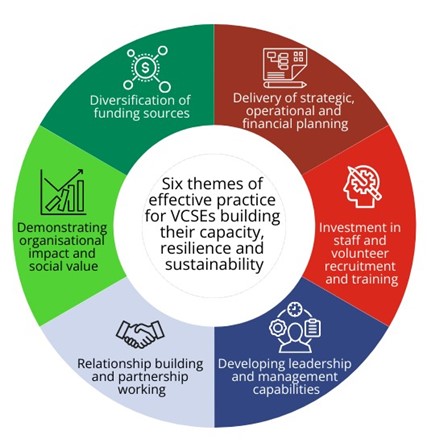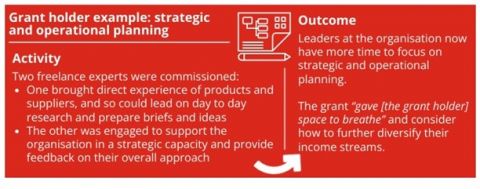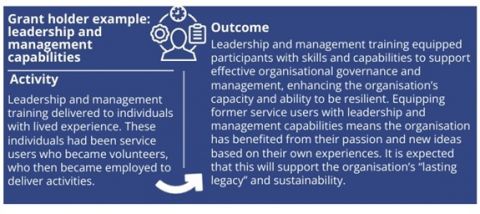Dormant Assets NI Phase 1 Grant Programme Evaluation: Building the capacity, resilience and sustainability of the VCSE sector in NI – what does the evidence say?
Dormant Assets NI evaluation
How can VCSE organisations build their capacity, resilience and sustainability? SQW’s Jane Meagher reflects on learning from SQW’s first interim evaluation report of the Dormant Assetsi NI Phase 1 Grant Programme, which included a review of the wider evidence base.
The need for voluntary, community and social enterprise sector organisations (VCSEs) to be capable, resilient and sustainable is more important than ever. VCSEs are under increasing pressure, not least due to the unpredictability and short term nature of the funding environment, issues in recruitment and retention, and key skills gaps. This context has been worsened by the cost of living crisis. In Northern Ireland specifically the collapse of the Northern Ireland Executive in 2022 also squeezed the amount of public funding available for VCSE organisations.
Through the Dormant Assets NI Phase 1 Grant Programme, The National Lottery Community Fund sought to support VCSE organisations in Northern Ireland to build their capacity, resilience and sustainability, providing grants of up to £100k to 244 VCSEs. These grants totalled more than £19.9m.
The Grant Programme was flexible about the types of activities it funded, provided the projects met the programme aim for the NI voluntary, community and social enterprise (VCSE) sector to be more resilient and prepared for the future, through increased capacity and sustainability. Projects also had to focus on at least one programme ‘outcome’ii. Given the complexity and variety of organisations in the sector, it was decided that individual VCSE organisations were best placed to decide what activities would address the issues they were facing.
But did grant funded organisations implement approaches which reflected published evidence on what works in building capacity, resilience and sustainability? This is one of the questions we sought to answer in our first interim evaluation report for the programme.
The six themes of effective practice
Our evidence review was rapid and relatively small-scale, involving a full text review of 16 documents identified as most relevant. That said, even in this small sample of documents there were clear and consistent themes emerging related to effective practice for VCSEs seeking to build their capacity, resilience and sustainability.

Encouragingly, findings from our initial engagement with grant holdersiii showed that much of what they delivered through the grant aligned with these six themes of effective practice.
Diversification of income sources
Exploring alternative income models, including social enterprise, crowdfunding and social investmentiv, can help to reduce VCSE reliance on short-term grants. Over half of the grant holders we surveyed used their grant to try to diversify their income streams.
The Dormant Assets NI Phase 1 Grant Programme did offer VCSE organisations short term grants, which, on the face of it, doesn’t align with this finding. But, an evaluation of another grant programme, the Reach Fund (delivered by Access), found that if short term grants are given with the aim of improving organisational capacity and resilience, they can support organisations to become investment readyv. We also captured examples of grant recipients increasing their regular income through diversifying their income sources:
“As a direct result of the grant, we implemented a digital solution which has secured a 73% increase in regular giving to the charity.” Grant recipient
The delivery of strategic, operational and financial planning
Undertaking regular strategic, operational and/or financial planning can help to identify opportunities and catch any issues early. While this is crucial for VCSE organisations, we heard from grant holders that it was difficult to free up the time of the people who need to deliver these activities (i.e. CEOs and Directors) – who were instead often involved in delivery.
To combat this, the Dormant Assets NI grant was often used to recruit staff or specialist support to deliver planning activities and to free up time for leaders and managers to deliver strategy planning.

Investment in staff and volunteer recruitment and training
Developing the capacity of the existing workforce can be more effective than creating a new postvi, not least due to the costs of recruitment compared with training. Nearly a quarter of grant holders we surveyed used their grant to deliver staff or volunteer training. This was reported to have led to a range of benefits for staff and volunteers - from changing mindsets, to improved skills and knowledge, to improved staff morale.
Developing leadership and management capabilities
Organisations which are less well managed are more likely to collapse when overwhelmed by challengesvii. Through the Grant Programme, VCSE organisations have been able to build their leadership capabilities, primarily through specialist leadership and management training.

Relationship building and partnership working
Less isolated VCSE organisations are more resilient in times of crisis, as they have opportunities to share workload and resourcesviii. Grant holders shared examples of the grant funding supporting relationship building with partners including corporate organisations and local stakeholders.
There were fewer examples of collaboration amongst VCSE organisations. In practice grant holders found this difficult to prioritise, or found it less fruitful than they were expecting – they put this down (at least in part) to an increasing sense of competition amongst VCSEs in light of constrained finances.
Demonstrating organisational impact and social value
VCSE organisations need to market themselves effectively to attract supporters, donors and funders – monitoring and evaluation are therefore crucial. Grant holders shared some examples of how they sought to demonstrate their impact and social value, including through marketing campaigns, improving their digital and social media presence, or developing promotional materials (e.g. impact case studies).

Reflecting on the evidence
The evidence outlines six key themes which can support VCSE organisations to build their capacity, resilience and sustainability. This suggests there is no silver bullet to achieving these impacts – in fact, the evidence was explicit in stating that these themes need to be tailored to the needs of individual organisations and delivered holistically. Just implementing one of these themes is unlikely to deliver change on its own.
We also have to consider the challenges facing VCSE organisations in implementing some of these themes of effective practice. Both the review of the evidence and speaking with grant recipients identified myriad difficulties facing the sector, as we set out at the beginning of this blog.
But, findings emerging from our evaluation of the Grant Programme so far are optimistic. They indicate that the Grant Programme has led to the delivery of activities which have been shown to be effective practice. The evidence emerging at this stage of the evaluation is that the grant is resulting in increased capacity, resilience and sustainability for VCSE organisations who received grants. This can only be promising news for the VCSE sector in NI.
If you would like to read more about the evaluation findings so far, please see SQW’s first interim report, executive summary and infographic. The evaluation is running until May 2025, and further reports will be published in January 2025 and in summer 2025.
The National Lottery Community Fund and SQW will be delivering a webinar on 16 October 2024, to reflect on findings from the interim report in more detail. You can find out more and sign up to the webinar using this link.

References:
- i) Previously Dormant Accounts Fund, at the time grants were issued
- ii) Programme outcomes sought:
- VCSE organisations will be more confident about their ability to adapt to future challenges
- VCSE organisations will be more financially resilient
- VCSE organisations will have increased skills and capacity
- Strategic planning in the VCSE sector will improve
- There will be more collaboration within and across sectors.
- iii) The first interim phase of the evaluation engaged with those grant holders who had been awarded grant funding at least a year prior (146 of the 244 grant funded organisations).
- iv) NHS Confederation (2020) How health and care systems can work better with VCSE partners, NHS Confederation. Available here: https://www.nhsconfed.org/system/files/2021-06/How-health-and-care-systems-can-work-better-VCSE.pdf; Macmillan, R et al. (2014) Building capabilities in the voluntary sector, Education Links. Available here: https://www.tnlcommunityfund.org.uk/media/insights/documents/Building-capabilities-in-the-voluntary-sector-what-the-evidence-tells-us-1.pdf?mtime=20240205163231&focal=none
- v) Goggin, N eta al. (2021) Reach Fund Evaluation Final Report. Available here: https://access-socialinvestment.org.uk/wp-content/uploads/2021/11/Access-Reach-Evaluation-Report-Final.pdf
- vi) MGarry Consulting (2023) Blueprint Phase 2 Initial Evaluation. Not publicly available.
- vii) Chapman, T. (2022) Going the distance: How Third Sector organisations work through turbulent times. Available here: https://www.communityfoundation.org.uk/wp-content/uploads/2022/10/Going-the-distance-how-third-sector-organisations-work-through-turbulent-times-October-2022.pdf
- viii) Macmillan, R et al. (2014) Building capabilities in the voluntary sector, Education Links. Available here: https://www.tnlcommunityfund.org.uk/media/insights/documents/Building-capabilities-in-the-voluntary-sector-what-the-evidence-tells-us-1.pdf?mtime=20240205163231&focal=none

